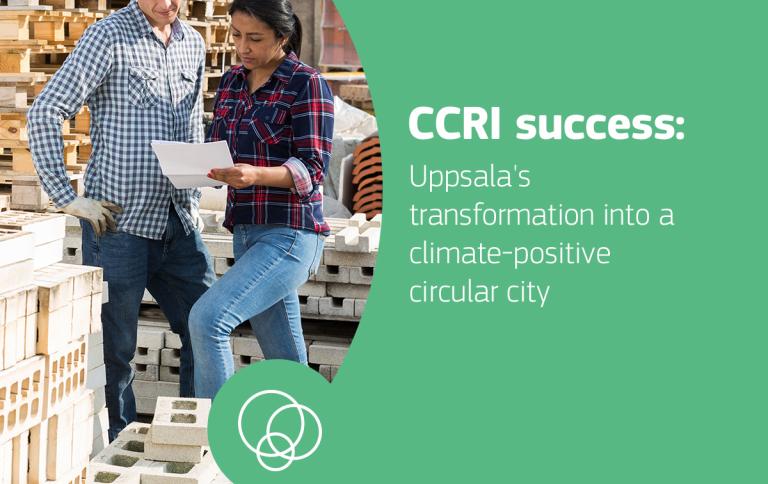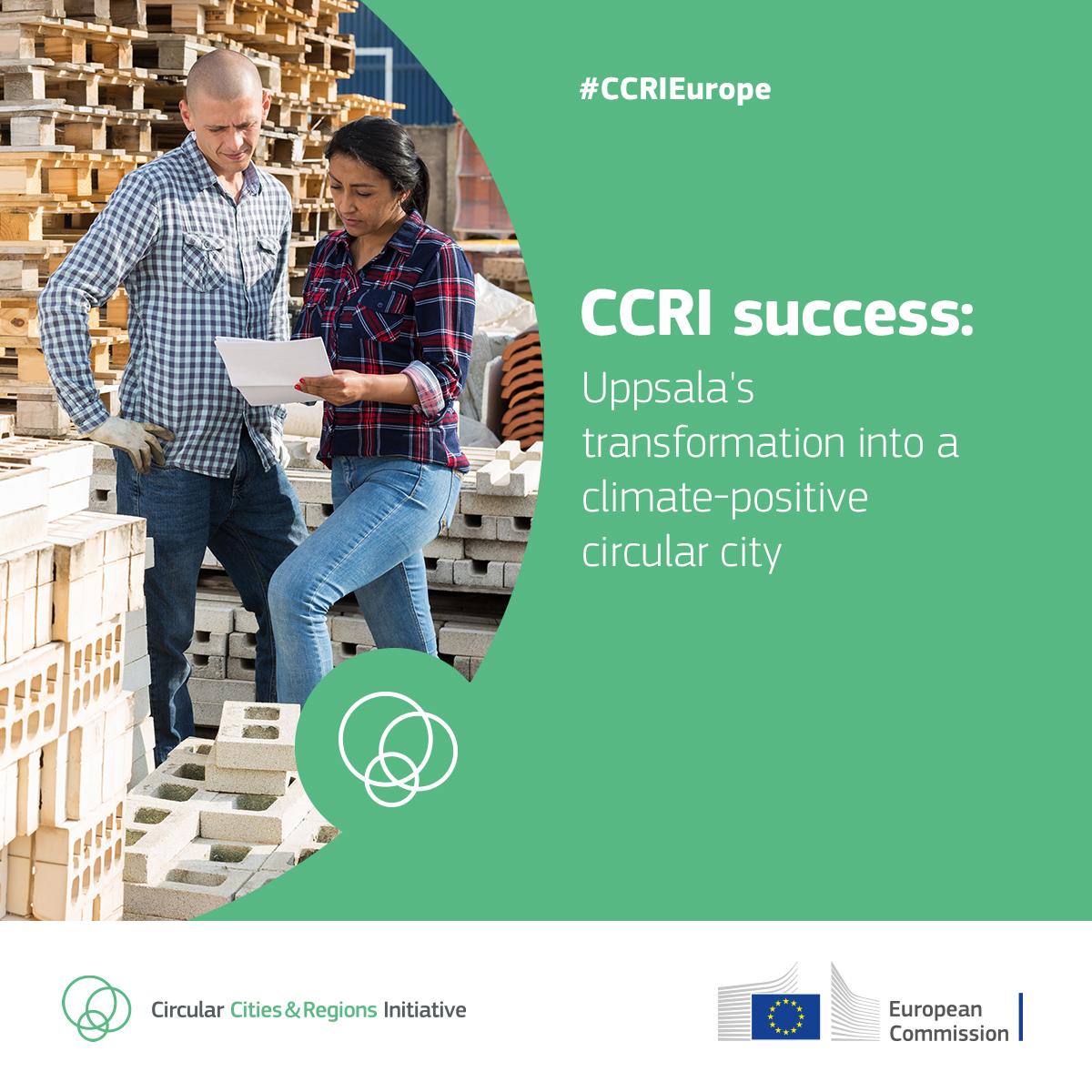CCRI success: Innovative building material marketplace transforms CCRI Pilot Uppsala into climate-positive circular city
Published on 16.06.2025
CCRI Pilot Uppsala, Sweden, has pioneered a bold initiative to create a circular systemic solution in the construction sector. With funding support from ERDF and expert guidance from the office, the municipality has established a physical marketplace for secondary construction materials. This innovative marketplace has not only addressed pressing construction waste management and sustainability challenges but has also catalysed private-sector collaboration, reduced emissions and reinforced Uppsala’s status as a climate-positive, circular municipality.

More information
The Circular Cities and Regions Initiative (CCRI) Pilot municipality of Uppsala, Sweden has created a successful business model for their first-ever circular building-material marketplace, as part of the Uppsala Climate Protocol.
Building on lessons learned from their pilot marketplace, which concluded in 2023, alongside European Regional Development Fund (ERDF) funding and CCRI Coordination and Support Office guidance, Uppsala has greatly upscaled their material reuse marketplace.
Uppsala’s new and improved marketplace in Ulleråker works with public and private actors to store and test materials from dismantled construction projects, making them available for reuse in future developments.
The problem: barriers to private-sector investment created an unsteady material supply
Uppsala’s initial pilot marketplace for secondary construction materials launched in 2023 but faced significant challenges in working with local actors to advance circularity in the construction industry.
By early 2024, Uppsala’s marketplace was discontinued, lacking both a framework for private-sector involvement and a reliable supply of surplus materials from building projects. The marketplace also had issues with profitability due to the high cost of collecting and storing materials, especially given that building projects may require materials to be stored for reuse up to two years in advance.
Overcoming these barriers required a more scalable and collaborative approach that integrated both public and private stakeholders while addressing economic and logistical challenges. Fortunately, in July 2024 Uppsala secured ERDF funding and bespoke CCRI-SCO support to continue its work on a new marketplace in Ulleråker.
Uppsala’s successful ERDF funding application allowed them to upscale the marketplace
To address these challenges, Uppsala developed a comprehensive strategy to enhance the marketplace.
First, Uppsala submitted an application for the ERDF programme for Eastern Central Sweden. The goal was to establish a clear use case for the marketplace, determine which construction materials and reuse activities should be prioritised, and identify the public and private actors to be involved.
The ERDF aims to strengthen economic, social and territorial cohesion in the EU, and its funding enabled Uppsala to expand their marketplace to include temporary, cost-free material storage, removing a large barrier to private-sector involvement.
This has helped ensure steady material flows for reuse in construction projects, advancing circularity across the value chain.
Uppsala’s commitment to becoming a climate-positive circular city
Besides being a CCRI Pilot, Uppsala is also a Pilot city under the NetZeroCities initiative. NetZeroCities aims to achieve climate neutrality in Europe, a goal that runs parallel to the CCRI’s objective of advancing the circular economy across European cities and regions to reduce pressure on natural resources.
An analysis revealed that, in support of both the CCRI’s and NetZeroCities’ goals, Uppsala’s marketplace has the potential to reduce greenhouse gas emissions by an estimated 386 tonnes to 1 534 tonnes of CO2 equivalents annually through the reuse and recycling of building materials.
Uppsala’s private initiatives have facilitated the involvement of private actors in the marketplace
The improved marketplace has fostered participation from new public and private actors including builders, material suppliers, architects, city planners and local authorities. Recently, Uppsala also succeeded in involving five private actors from the real estate sector in the local secondary construction market.
Since autumn 2024, these private entities have been collaborating with each other and the Uppsala Climate Protocol to establish a sustainable circular material hub focused on commercial properties, materials and products that will complement Uppsala’s circular marketplace.
Following the publication of their letter of intent on 24 April, the group has intensified their efforts to launch the circular material hub. Their current focus is on creating a lasting market around the hub with a sustainable business model.
The CCRI-CSO’s external support scheme for Pilots enabled Uppsala to create the marketplace’s successful business model
Working in collaboration with Rotor, a pioneering Brussels-based marketplace for salvaged building materials, the CCRI office has provided significant support to Uppsala’s circular marketplace, leveraging Rotor’s expertise and extensive network of partner marketplaces in France and the Benelux.
Starting in April 2025, a research collaboration between the CCRI office and Rotor has offered Uppsala valuable insights and advice on marketplace ownership models, material prioritisation and investment strategies.
This collaborative research effort is providing key insights that are shaping the design of Uppsala’s marketplace and operational framework. It has also guided key stakeholders, such as the Uppsala Municipality and private and civil society actors, involved in the local climate protocol’s working group on building-material reuse.
With this research, Uppsala aims to better understand the benefits and challenges of ownership structures for publicly funded and public-private marketplaces, including physical and digital formats.
Additionally, the research explores how materials and products are prioritised and managed in these marketplaces and identifies the key factors for successful marketplace investments. This includes outcomes for public and private investors and effective models for fully public and public-private marketplaces.
Uppsala's circular marketplace, has addressed local challenges and supported global circularity efforts
Uppsala’s circular marketplace exemplifies the power of systemic solutions in driving sustainability and fostering public-private collaboration. With strong support from ERDF funding and CCRI office expertise, the city has established a scalable model that not only addresses local challenges but also sets a precedent for global circularity efforts.


built environment, CEAP2 key product value chain
large 500 000-200 000, medium 200 000-50 000, and small cities 50 000-5 000



